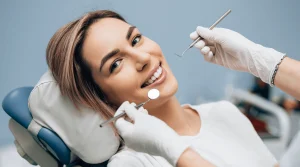
A first dental visit is an important step in maintaining good oral health. It provides an opportunity to establish a relationship with a dentist and discuss any concerns or questions you may have about your oral health. During the visit, the dentist can perform a comprehensive oral exam to assess the health of your teeth, gums, and mouth and identify any potential problems. This is especially important for people who have not been to the dentist in a while or who have never been to the dentist before, as it can help detect any issues in their early stages when they are easiest to treat. The dentist can also provide recommendations for preventive care, such as regular cleanings and fluoride treatments, to help maintain good oral health. Overall, a first dental visit is an important step in ensuring the health of your teeth and gums.ur first dental visit is an important step in maintaining good oral health. It is an opportunity to establish a relationship with a dentist and to discuss any concerns or questions you may have about your oral health.
A dental visit is a trip to the dentist for the purpose of assessing and maintaining the health of the teeth and mouth. During a dental visit, the dentist will typically perform a comprehensive oral exam to look for any signs of problems such as decay, gum disease, or oral cancer. The dentist may also take x-rays to get a better view of the teeth and supporting structures. Based on the findings of the exam, the dentist may recommend treatment to address any problems that were identified, as well as preventive care such as cleanings and fluoride treatments to maintain good oral health. It is important to visit the dentist regularly, as recommended by the American Dental Association, to ensure the health of the teeth and gums.
During your first visit, the dentist will typically perform a comprehensive oral exam. This will involve looking at your teeth, gums, and mouth for any signs of problems such as decay, gum disease, or oral cancer. The dentist may also take x-rays to get a better view of your teeth and supporting structures.
The dentist will also clean your teeth. This is known as a prophylaxis or “prophy” for short. The prophy involves removing plaque and tartar (hardened plaque) from your teeth and can help prevent cavities and gum disease. The dentist may also apply fluoride to your teeth to help strengthen them.
After the exam and cleaning, the dentist will discuss any findings and recommendations with you. This may include a treatment plan to address any problems that were identified, as well as recommendations for preventive care such as regular cleanings and fluoride treatments.
It is important to be honest with your dentist about your oral health habits, such as how often you brush and floss, and to ask any questions you may have. The more you understand about your oral health, the better equipped you will be to take care of your teeth and gums.
Your first dental visit is an important step in maintaining good oral health, and it is important to establish a relationship with a dentist that you feel comfortable with. By following the recommendations of your dentist and practicing good oral hygiene habits, you can help ensure that your teeth and gums remain healthy for years to come.

